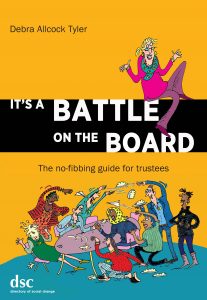Fundraising, Community and events, Self-improvement
It's a Battle on the Board
Current trustees and aspiring trustees, this one is for you.
Being a trustee is an incredible privilege. You have been voted on to the board of trustees of a charity that serves a cause you care about. You have become one of around one million other great people who have also stepped up to serve as a trustee of one of around 200,000 charities registered in the four nations of the UK. Charities who are saving, supporting, enhancing or helping the lives of other human beings, animals and the environment. Incredible and important work.
Deliver what you promise
At its core your job is to make sure that your charity delivers its charitable objects for its beneficiaries for public benefit. And in many ways that’s not a particularly complex task. You essentially need to know what it is your charity is trying to do, what powers you have as trustees to make it happen whilst ensuring that you are complying with the relevant legislation and regulations. Pretty straightforward right?
Challenges exist for every charity
So, if it’s that simple why is it that sometimes governance can sometimes feel so difficult? The thing is that all charities will face challenges. There are the everyday challenges of raising money and influencing policy which always exist. Then there are the one-off challenges of things going wrong like the IT failing or a project not going to plan. And then of course the mega challenges of unpredictable global pandemics.
And the single most important thing that will help you to navigate all those challenges is going to be how well you run yourself as a board. Not how much you understand your governing documents, or the latest charity accounting rules or the most recent data protection regulations – but how well you work together; how strong your relationships are with other trustees and your senior staff and volunteers, how good your communication is and how well you manage conflict.
It’s a Battle on the Board
My book, It’s a Battle on the Board, looks at the human, psychological side of being a great trustee. Whilst it covers some of the technical aspects such as understanding charity finance or complying with the Charity Governance Code, mostly it’s about you, a human being, interacting with other human beings who you don’t see very often, probably don’t know very well and, on hopefully rare occasions, aren’t actually all that fond of! You’ll need to read the book to get the best benefit but here are some key bits of advice:
- Take time to get to know your fellow trustees – turn up to meetings early; meet for coffee (either virtually or physically); learn about what interests them, annoys them, inspires them.
- Get the communication of information right. Your job is strategic not operational – you need to see trends, patterns, issues over time. Information that enhances your strategic understanding of the performance and direction of the charity. Don’t confuse detailed data with information – the more detailed the data the less well-informed you are likely to be.
- Remember that it is the job of your executive team to give you information and guidance so that you can make good decisions on behalf of your charity. They are your paid experts, there to deliver the work, share their expertise with you and give you advice on the best way forward. Treat them as such.
- Make sure your board is reflective of the communities that you serve and society as a whole. Are you sufficiently diverse and, probably more importantly, inclusive? Do you make sure that your meetings and communications are such that they can accommodate people with caring responsibilities or work that they can’t take time out of during the day or when English is not their first language?
- Take the time to really understand those whom your charity serves. Don’t be a trustee who only hears about the work at a board meeting or in a report. Make sure you find some way to hear directly from those you serve. Not only will it make you a better trustee it will fill you with inspiration and joy to know that when you are ploughing through management accounts or arguing about strategy in the end you are making a huge difference to someone’s life.
And finally thank you for being a trustee. You are helping to make our world a better place. Click here now to find out more about It’s a Battle on the Board.
About Debra Allcock Tyler
Debra is CEO of DSC and author of It’s Tough at the Top, The Pleasure and the Pain, It’s Murder in Management and It’s a Battle on the Board.


